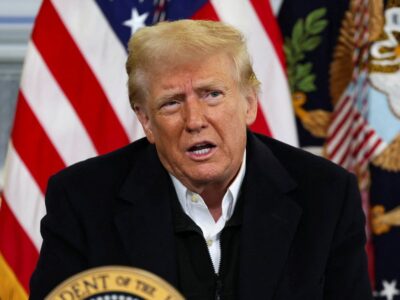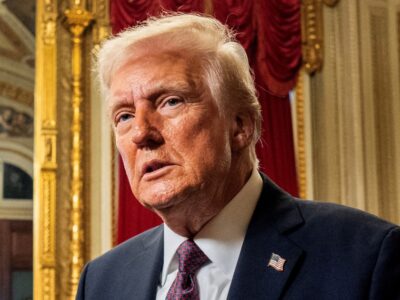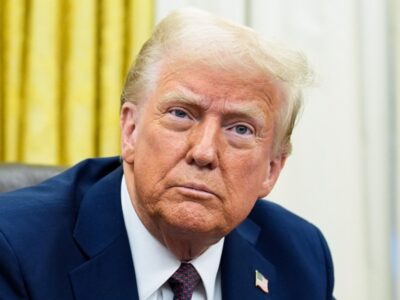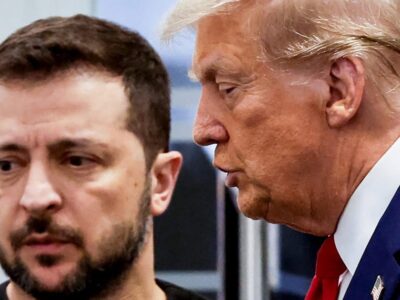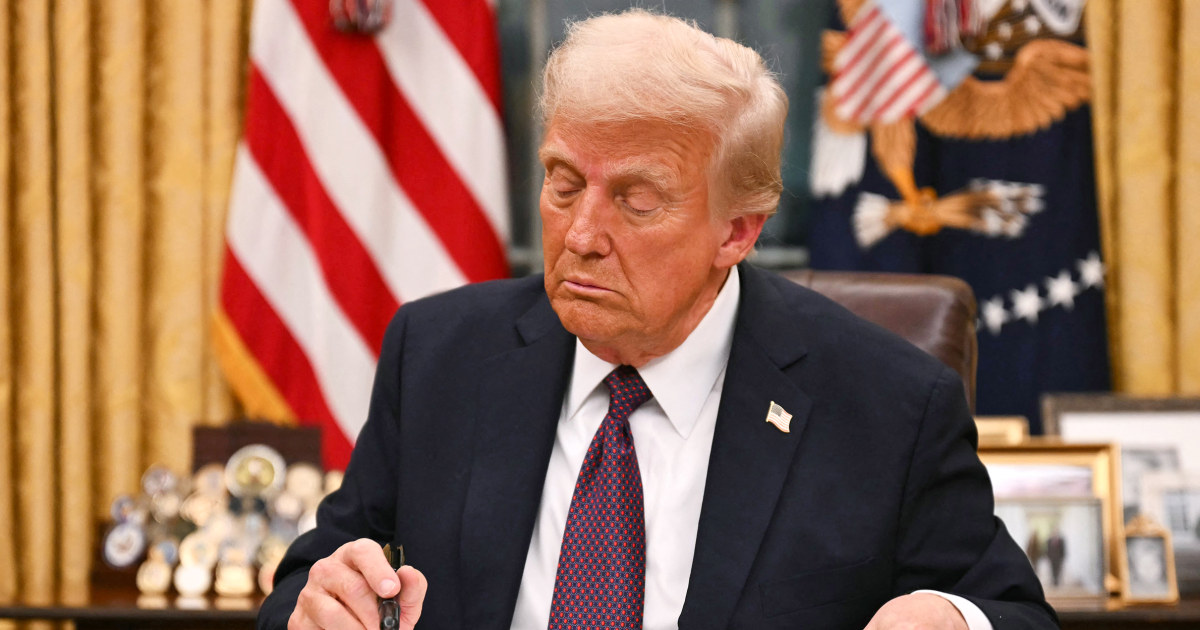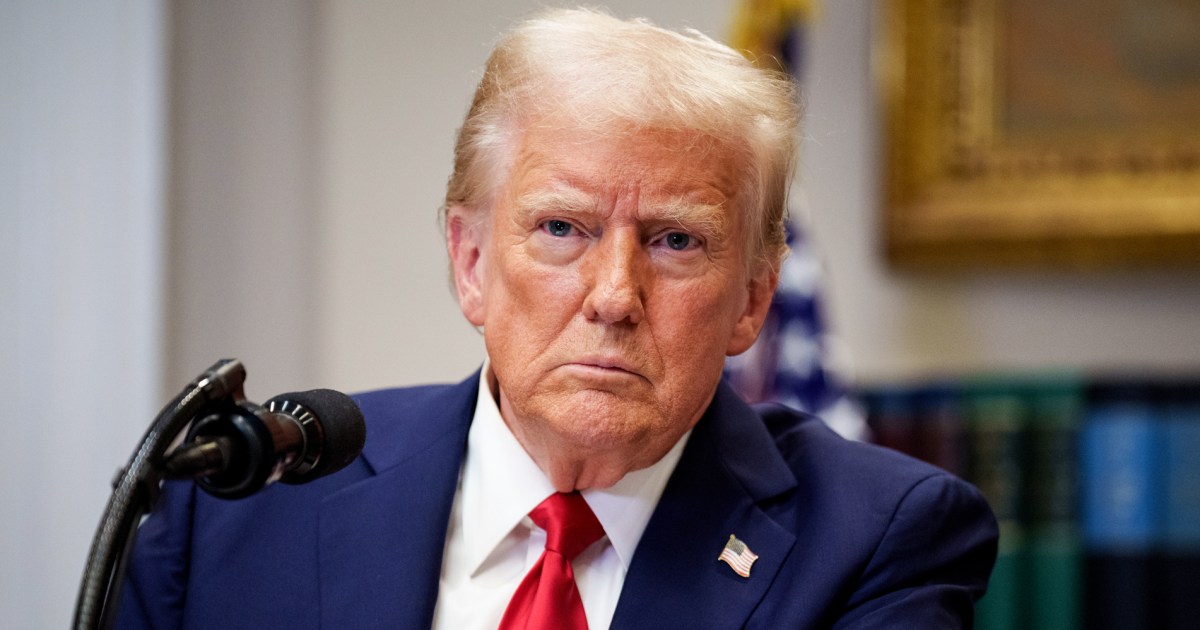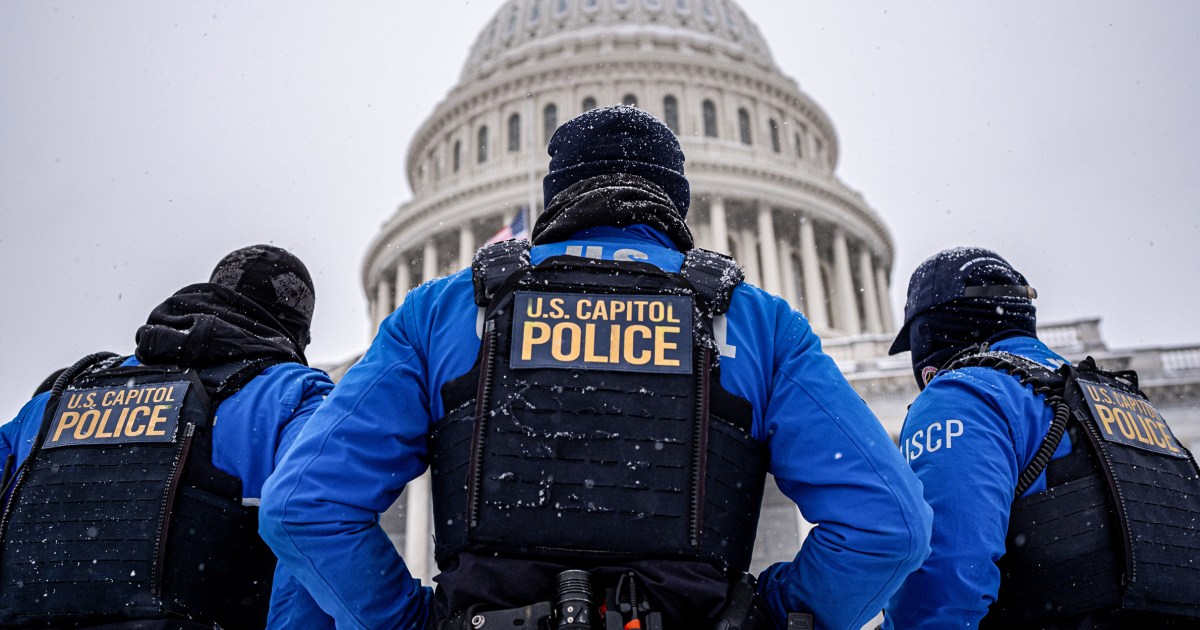
In the spring of 2018, congressional staffers were anxious ahead of a House Foreign Affairs Committee meeting.
A Syrian defector who had risked his life to expose atrocities committed by the Assad regime was due to appear behind closed doors at a private briefing for lawmakers.
No cameras would be present, but congressional aides worried about one committee member, Democratic Rep. Tulsi Gabbard, who had repeatedly defended the Syrian regime and even met its leader, Bashar al-Assad, in an unannounced trip in 2017.
The aides were concerned Gabbard might leak information about the defector, who had hidden his identity out of fear of reprisals from the Assad regime. Some worried that she might even reveal his identity to someone associated with the Syrian government, which at that point had killed hundreds of thousands of its own citizens, according to human rights groups.
Both Democratic and Republican aides told the Syrians accompanying the defector, known as “Caesar,” to ensure that he covered his face before Gabbard entered the room — just in case.
“It was Democratic and Republican staffers on the committee coordinating with me to figure out how do we make sure that Tulsi doesn’t take a photograph of Caesar, or learn his real name, or record his voice,” said Mouaz Moustafa, executive director of the Syrian Emergency Task Force who helped organize Caesar’s appearance and translated for the session.
In the past, Caesar had spoken privately to members of Congress without his face covered when Gabbard was not present. But not at the special briefing in the summer of 2018.
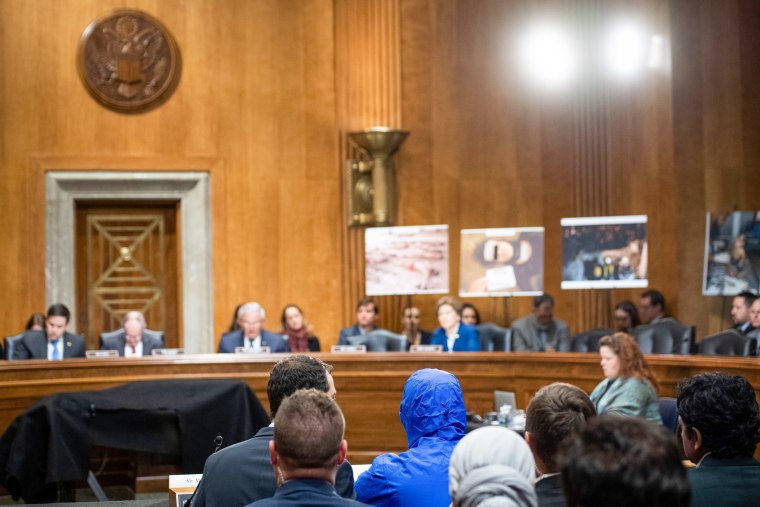
A Syrian military defector using the pseudonym Caesar, while also wearing a hood to protect his identity, testifies about the war in Syria during a Senate Foreign Relations committee hearing on Capitol Hill in 2020.Saul Loeb / AFP via Getty Images
“There were bipartisan concerns for Caesar’s safety,” a former staffer who was involved in the discussions and asked not to be named. “Most specifically, because then congresswoman Gabbard had earlier returned from Damascus and met with Assad,” the former staffer told NBC News.
The episode reflects the deep misgivings that many lawmakers, intelligence officials and human rights activists have harbored for years about Gabbard.
Now, President-elect Donald Trump has nominated the former lawmaker to serve as the country’s highest-ranking intelligence official. If confirmed, Gabbard would have access to a trove of top secret material and have the final word on what spy agencies share with the president in regular intelligence briefings.
A spokesperson for the Trump transition team said Gabbard, a lieutenant colonel in the Army Reserve, has an active top secret security clearance and has never breached the confidentiality rules around classified information.
“As someone who served for eight years in the U.S. House of Representatives and attended many classified briefings, there is zero evidence that confidentiality has ever been violated,” said spokesperson Alexa Henning.
Asked about the case of congressional staffers in 2018 who were concerned she might not safeguard the Syrian defector’s anonymity, she said: “This is another smear by anonymous officials with no proof.”
As a presidential candidate, a member of Congress and a commentator supporting Donald Trump’s campaign, Gabbard has been accused of repeatedly echoing propaganda spread by Russia and the Assad regime, including questioning U.S. intelligence assessments that the Syrian government carried out multiple chemical weapons attacks on its own people.
On Thursday, nearly 100 former diplomats, national security officials and intelligence officials wrote to Senate leaders expressing alarm at Gabbard’s nomination. The former officials, who have served under both Democratic and Republican administrations, urged closed-door confirmation hearings to allow lawmakers to carry out a full review of government information about Gabbard.
“Several of Ms. Gabbard’s past actions call into question her ability to deliver unbiased intelligence briefings to the President, Congress, and to the entire national security apparatus,” the letter stated.
At a moment of historic upheaval in the Middle East with Syrian rebel forces toppling the Damascus regime and Assad fleeing the country, Gabbard’s views on Syria — and its former Russian and Iranian patrons — will be under fresh scrutiny as senators weigh her nomination. She is expected to begin meeting with lawmakers next week in advance of her confirmation hearings.
Henning, the spokesperson for Gabbard on the transition team, dismissed the letter as an “unfounded” attack by people who oversaw foreign policy and intelligence debacles in the past, including the 2003 invasion of Iraq.
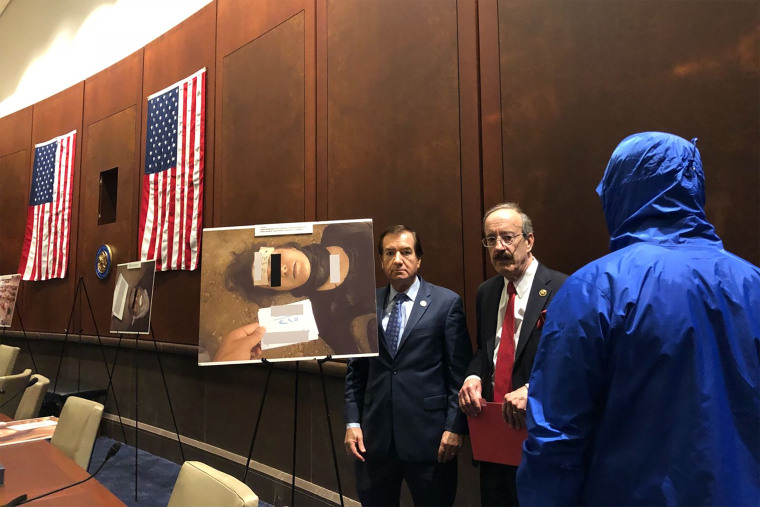
A Syrian defector named “Caesar” meets with House Foreign Affairs Committee members on Capitol Hill in 2018.@HouseForeign via X.com
“These unfounded attacks are from the same geniuses who have blood on their hands from decades of faulty ‘intelligence,’ including the non-existent weapons of mass destruction,” said Henning, referring to a purported justification for the start of the Iraq War that turned out to be false.
A rising Democratic star
In 2012, after a surprise election victory as Hawaii’s new congresswoman at the age of 31, Gabbard was seen as a rising young star in the Democratic Party, a fresh face who had served in the Iraq War with the Army National Guard.
During her early days in Congress, Gabbard was part of a bipartisan exercise group in the House. She was also often invited to informal gatherings of a small group of Democrats favoring a moderate foreign policy.
Gabbard appeared even-keeled in her manner and there was no sign she had any predisposition toward authoritarian regimes or bought into their propaganda, according to those who knew her at the time.
“Every time you talked to her you just felt like this is a measured, thoughtful person. Not prone to hyperbole, not prone to get overly excited or angry,” said Democratic Rep. Seth Moulton of Massachusetts, also a veteran of the Iraq War. “Exactly the kind of attitude and demeanor that I grew to expect from the military.”
Her arrival in Congress coincided with Syria’s descent into civil war.
The Assad regime brutally crushed peaceful political protests in 2011, firing on unarmed demonstrators and carrying out mass arrests and torture. The crackdown led the opposition to take up arms and an all-out war, with the regime launching chemical weapons attacks and Russian-backed air raids on Syrian cities and towns.
As the war intensified, Gabbard’s sympathetic statements about the Russian-backed Assad regime raised eyebrows and alarmed her colleagues.
In 2014, Gabbard first encountered the defector Caesar at a hearing before the House Foreign Affairs Committee, where he appeared before cameras with his face covered to shield his identity.
Citing some 50,000 photographs smuggled out of Syria, Caesar outlined how the regime had executed and tortured tens of thousands of Syrians who dared to oppose the regime.
Gabbard praised his “courage” and asked Caesar if armed rebels were strong enough to take on Assad. Caesar assured her that they were strong because they believed in their cause and that their cause was “just.”
In 2015, Gabbard was invited on a congressional trip to the Turkish-Syrian border, where she and other members met medical workers, activists and wounded civilians who recounted the fallout from the Assad regime’s military attacks. Syrian human rights advocates hoped the trip might lead her to reconsider her views.
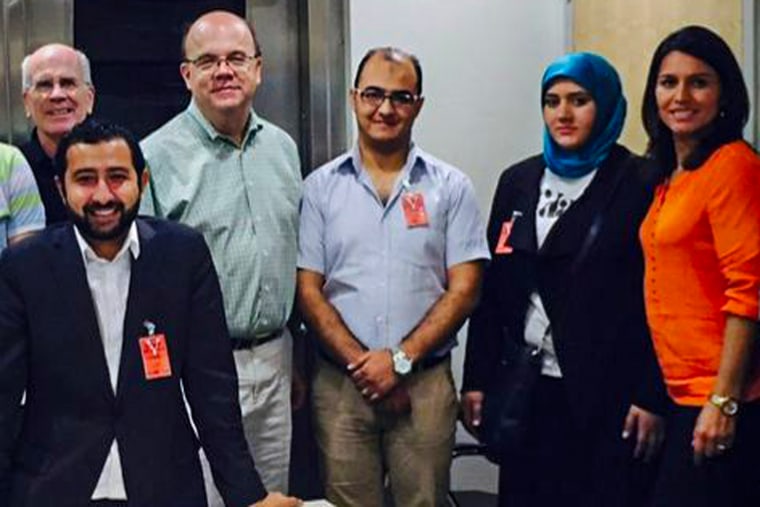
Gabbard was part of a congressional delegation in Gaziantep, Turkey, near the Syrian border in June 2015.Courtesy Syrian Emergency Task Force
Gabbard and the other lawmakers traveled to Gaziantep, just over the border from Syria, and spoke to Syrian civilians who had been forced to flee their homes. She took notes and nodded politely but rarely spoke, according to Moustafa, who accompanied the delegation.
Although the trip took place nine years ago, one exchange has stayed with Moustafa. Two Syrian girls described suffering severe burns when aircraft bombed their displaced persons camp.
“She asked them, ‘How do you know it was the Russians and Assad who did it and not ISIS?’” Moustafa said.
Gabbard’s question shocked Moustafa, as the lawmaker did not say anything else to the children. And Gabbard’s intervention showed how badly informed she was, he said. ISIS had no air force.
“After that conversation with the little girls, I saw there was nothing to be done,” Moustafa said. He concluded that “facts don’t matter” to Gabbard and there was no way to shift her view. He added it would be “dangerous” for Gabbard to be given the top U.S. intelligence job.
Washington Post columnist Josh Rogin first reported on the exchange.
Gabbard’s spokesperson called the account of the conversation with the Syrian children “false.”
Afterward, Gabbard did not publicly refer to what she and the other members of the delegation saw and heard firsthand from Syrian civilians. Two years later, she made an unannounced trip to meet Assad, the leader of Syria accused of orchestrating large-scale atrocities.
By the time of her 2017 visit, U.S. diplomatic relations with Syria had been suspended for five years and Russian air power, Iran’s Revolutionary Guard troops and Lebanese Hezbollah fighters had shored up Assad’s forces.
Gabbard did not tell most of her Democratic colleagues about the trip. Syrian-Americans linked to a pro-regime party paid for her flight and hotel and organized her meetings. After news of the trip became public and Gabbard came under criticism, she said she repaid the cost of the trip in full.
The Trump transition spokesperson said Gabbard handled the trip in accordance with congressional rules.
“She did everything that was required of any Member (of Congress) going on foreign travel by getting the itinerary and trip approved by House Ethics Committee prior to travel and submitting post trip reports upon returning,” Henning said. “She also met with the U.S. Ambassador in Lebanon.”
Henning added: “Due to security concerns and active terrorist activity that would compromise the safety of everyone on the trip if it were leaked in advance, she kept the trip under close hold.”
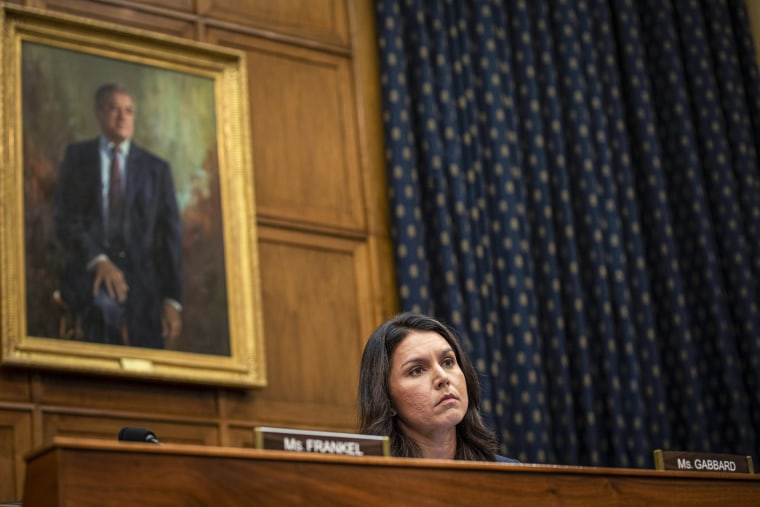
Tulsi Gabbard at Capitol Hill in 2018.Drew Angerer / Getty Images
Following her meeting with Assad, Gabbard defended her trip in interviews at the time and said she was “skeptical” that Syria was responsible for a chemical weapons attack that killed dozens of people.
U.S. intelligence agencies, the United Nations and the Organization for the Prohibition of Chemical Weapons concluded that the Assad regime was behind that attack, as well as multiple other attacks.
She also embraced the Assad regime’s line that the war was a struggle against Islamist terrorists. Speaking about her trip in 2017, Gabbard told CNN that “people of all ages they asked me, ‘why is the United States and its allies supporting these terrorist groups who are destroying Syria, when it was Al-Qaeda who attacked the United States on 9/11 not Syria?’ I didn’t have an answer for them.”
The United States waged an air war against ISIS extremists in Syria and Iraq and did not support terrorists in Syria.
The Obama administration did provide limited assistance and training to some Syrian armed groups that Washington deemed as moderate forces opposing Assad. But the military aid ended in 2017 and anti-regime forces splintered, with hardline Islamists taking on a prominent role.
In an interview with journalist Ryan Grimm after her 2017 meeting with Assad, Gabbard aid that during her conversation with the Syrian president, she challenged him to hold free and fair elections with international observers and that Assad agreed. No such elections have taken place.
Gabbard has rejected accusations that she is aligned with authoritarian leaders or undermining U.S. interests. She maintains she is coming under attack for questioning Washington’s establishment and opposing U.S. military “regime change” interventions including the 2003 U.S. invasion of Iraq.
“Lt. Col. Gabbard has seen the casualties of war firsthand, and like President Trump, is committed to peace and preventing endless wars,” Henning said.
Concerns among lawmakers and intelligence officials
Several Republicans have indicated they will enthusiastically support Gabbard’s nomination. But Republican Sen. James Lankford of Oklahoma, a member of the Senate Intelligence Committee, said he would like to know more about her 2017 meeting with Assad.
“We’ll have lots of questions. She met with Bashar Assad, we’ll want to know what the purpose was and what the direction for that was, as a member of Congress,” Lankford told CNN.
One former senior intelligence official said Gabbard’s statements on Syria called into question her willingness to accept facts that don’t fit her world view.
“She basically completely adopted the Assad regime propaganda, where she suggested falsely that the U.S. was supporting terrorist extremists in Syria, and didn’t mention that the Assad regime had been slaughtering fellow Syrians there,” the former official said. “So what does that say about her judgment?”
Some lawmakers and former intelligence officials say they worry that America’s partners, including those in the vital “Five Eyes” intelligence alliance — the United States, Britain, Canada, Australia and New Zealand — may choose to withhold some sensitive information if they distrusted Gabbard as director of intelligence.
Nikki Haley, the former Republican governor of South Carolina who served as ambassador to the United Nations in the first Trump administration, has sharply criticized Gabbard’s nomination, saying her statements showed she was not ready to assess threats to the United States.
“After Russia invaded Ukraine, Tulsi Gabbard literally blamed NATO, our western alliance that’s responsible for countering Russia,” Haley said on her Sirius XM radio show last week. “She blamed NATO for the attack on Ukraine, and the Russians and the Chinese echoed her talking points and her interviews on Russian and Chinese television.”
She added: “This is not a place for a Russian, Iranian, Syrian, Chinese sympathizer.”
This story has been updated to reflect the fall of the Assad regime in Syria.

